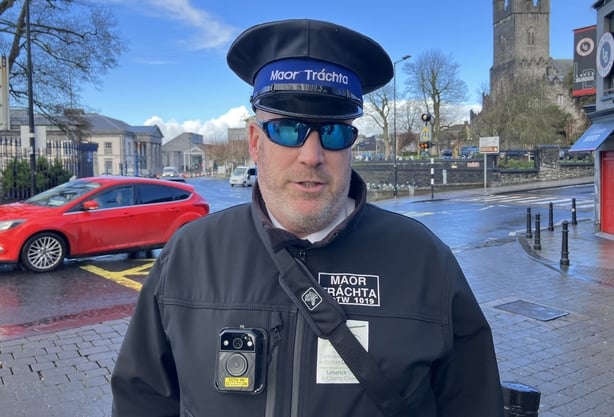Traffic wardens in Limerick city have begun using body-worn cameras in response to violence and aggression encountered in the course of their duties.
Limerick City and County Council said the initiative aims to enhance the safety and security of traffic wardens while they perform their duties.
It follows an average of 15 "extreme incidents" a year including verbal threats, physical assaults, and even having "vehicles driven at them", according to Senior Executive Engineer Liam Browne.
Speaking to RTÉ's Drivetime, Mr Browne said it is hoped the introduction of the cameras will "reduce the number of these incidents" and provide evidence that "gardaí may be able to use for prosecutions".
He said the primary objective of introducing cameras is to "reduce incidents of violence and aggression" towards traffic wardens, providing them with a safer working environment.
Cameras will remain off until a traffic warden perceives or anticipates a threat, at which point they will activate the device to record audio, video and GPS data.
The council said footage will be securely stored and accessed only by authorised personnel, ensuring privacy and data protection in a six-month trial that follows a public consultation period where feedback from residents, businesses, and other stakeholders was gathered.

The pilot project in Limerick follows similar initiatives by some local authorities in Dublin, Donegal, Longford, Laois and Waterford and also follows the separate roll out of body-worn cameras by gardaí in Dublin, Waterford and Limerick.
"Anecdotally we’ve heard from Waterford (County Council) and the gardaí that they experienced a 90% per reduction in incidents," Mr Browne said.
He said the local council is "hoping that after this six-month pilot, we'll observe a reduction in the number and severity" of incidents.
Traffic warden James, who does not want to give his surname for personal security reasons, said he spends much of his time helping people, including tourists around Limerick city.
However, he said unfortunately "we’re seen as the bad men" by "some people who choose to become verbally abusive or aggressive" after receiving a ticket "despite the fact that they have caused it themselves by parking in the wrong place".
Asked about his own negative experiences, James recounted being "hit, head-butted, spat at" and even having "a car driven" at him.
We need your consent to load this rte-player contentWe use rte-player to manage extra content that can set cookies on your device and collect data about your activity. Please review their details and accept them to load the content.Manage Preferences
Some incidents caused him "minor physical injuries" he said and while such occurrences are "few and far between", any incident like that "shouldn’t happen to anybody in any workplace".
James said he hopes he will not have to use the camera but that "merely by wearing it and the threat of recording somebody’s behaviour" it will be enough to stop them.
Unfortunately, he added, "there will be incidents where we will have to record people" and go through the process of forwarding that "on to the gardaí" but said he feels safer now.
"Previously it was my word against somebody else’s whereas now we will have actual video evidence of the incident," James said.
The trial will be closely monitored and evaluated and, if successful, the council intends to continue using these cameras on a full-time basis.
It also urged members of the public to be respectful of all council staff as they carry out their duties.







